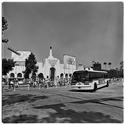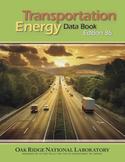My latest column is now online in the March issue of Governing. It’s called “A Tip for Infrastructure Builders: Fix It First.” Here’s an excerpt: read more »
Transportation
Why We Should Fix It First with Infrastructure
- Login to post comments
Connecting the Dots by Transit in Los Angeles?
Over the past three years, the nation’s largest transit systems have endured a broad and unprecedented ridership decline. By far the largest drop has been in Los Angeles and this has resulted in justifiable consternation. read more »
- Login to post comments
Autonomous Cars Are About To Transform The Suburbs
Suburbs have largely been dismissed by environmentalists and urban planners as bad for the planet, a form that needed to be eliminated to make way for a bright urban future. Yet, after a few years of demographic stultification amid the Great Recession, Americans are again heading to the suburbs in large numbers, particularly millennials. read more »
- Login to post comments
Olympics Transportation: The L. A. Times Needn’t Worry
The Trump Infrastructure plan has finally been released. The critics are out in force, especially those with particular interest in rapid transit. The plan would reduce funding to the federal “new starts” program, which provides funding for new urban rail and busway systems. The Los Angeles Times editorial board expressed angst at this proposal. According to The Times, the "…public transit building boom in L.A. read more »
- Login to post comments
2017: Transit’s Disastrous Year
Nationwide transit ridership in December 2017 was nearly 5 percent less than December 2016. Ridership for the calendar year was 2.6 percent less than in 2016 and 6.7 percent less than 2014, transit’s recent peak. These numbers are based on the latest National Transit Database spreadsheet posted by the Federal Transit Administration. read more »
- Login to post comments
Rising Car Access Sends LA’s Transit Ridership Falling
Transit ridership is down in a number of markets, but LA’s declines have attracted a lot of attention – and for good reason. LA has invested billions of dollars in rail transit but has failed to grow ridership, which is still below its 1985 levels. And ridership has actually been falling in recent years, even on the existing core rail lines. (New and expanded lines saw some growth). read more »
- Login to post comments
Trump’s Infrastructure Plan Is A Rare, And Potentially Bipartisan, Feel Good Moment
President Trump’s proposed trillion dollar plus infrastructure program represents a rare, and potentially united feel good moment. Yet before we jump into a massive re-do of our transportation, water and electrical systems, it’s critical to make sure we get some decent bang for the federal buck. read more »
- Login to post comments
Transportation Energy Costs
The average car on the road consumed 4,700 British thermal units (BTUs) per vehicle mile in 2015, which is almost a 50 percent reduction from 1973, when Americans drove some of the gas-guzzliest ca read more »
- Login to post comments
Uber, the “Metropocalypse,” and Economic Inequality in D.C.
Public transit infrastructure in Washington, D.C. is crumbling. Metro and bus services have been cut. Fares have gone up. And, safety remains a problem. After 40 years of deferred maintenance, poor management, and the lack of decent, long-term funding, the Metro system needs $1.4 billion worth of repairs, and it must close a $290 million budget gap just to continue basic operations. Some call this the “metropocalypse.” read more »
- Login to post comments
Ground Transportation Gaps
A theme de rigour at transportation conferences these days is Americans’ reduced affinity for driving. It is a pervasive premise: that young people and urbanites only want “to get from point A to point B.”
Such claims ring true in numerous dense urban settings where transportation network companies (TNCs) such as Lyft and Uber, as well as bikesharing and carsharing are all flourishing. Car-free living is on the rise. read more »
- Login to post comments





















